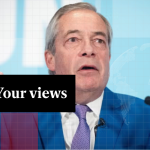Party leaders on both sides of the political divide in Northern Ireland agree that the Stormont assembly election on May 5 could be the most important in a generation. Polls continue to suggest that Sinn Féin will become the largest party for the first time in Northern Ireland’s 101-year history – a victory which could see republicans leading a state they once promised to destroy.
The unionist DUP may face the difficulty of serving as deputy to a Sinn Féin first minister. Although the first and deputy first minister roles at Stormont are equal in terms of their powers, even titular subservience to republicans is ideological anathema to unionists. Having emphasised the importance of winning the first minister role for so long, now losing it would be a further blow to unionists’ already fragile morale.
Many are unsympathetic. The DUP backed Brexit, then resisted former prime minister Theresa May’s efforts to deliver a deal that would avoid any border controls. Instead, the party aided Boris Johnson in replacing May, despite widespread predictions that he would abandon unionists – as he swiftly did.
The DUP, currently the largest party, had already resigned the first minister role in February in protest at the so-called Northern Ireland protocol – the section of the UK-EU Brexit trade deal which left the region effectively under Brussels’ regulation.
The continued application of EU rules to Northern Ireland was seen as the only way to avoid controls on the Irish border, which would undermine the 1998 Good Friday Agreement. Instead, there are now checks on goods arriving in Northern Ireland from Britain. Unionists argue this creates a border in the Irish Sea, thus separating Northern Ireland from Britain and undermining its place in the Union. DUP leaders insist the protocol must be scrapped before they will return to power-sharing.
There seems little very chance of the protocol being abandoned, though just last week Johnson was once again suggesting that his government would override it if required. Such threats have been made many times before, but London has always ended up backing away from any move that would break its treaty with the EU, and thus international law. More likely, Johnson is merely gesturing to help boost the DUP’s electoral support. Even it responded coolly to Johnson’s latest comments on the protocol, having been let down so often before.
Campaigning on the issues
It is notable, however, that Sinn Féin is largely avoiding any rhetoric that would further embarrass the DUP. Republicans are more focused on discussing issues like the rising cost of living than the prospect of winning the first minister post or a referendum on Irish unity.
This is a sensible strategy. Sinn Féin knows it needs the DUP to make power-sharing work, but also has its eyes on a bigger prize – leading the government in Dublin. Polls in the Irish Republic also suggest this is likely. Sinn Féin is thus being careful not to upset more moderate voters who now see it as a mature political party, capable of running governments either side of the Irish border. In doing so, republicans feel they can practically demonstrate the logic and benefits of Irish reunification rather than merely talking about it.
Sinn Féin is also aware of the increasing number of non-aligned voters in Northern Ireland – people who see themselves as neither nationalist nor unionist. It is those who vote for left-wing or liberal parties, or are more concerned about the environment, that will really decide the future of Northern Ireland. With the latest census data likely to show near parity in the number of Protestants and Catholics in the region, those who eschew such labels will be required to create a winning majority for constitutional change.
Sinn Féin and the DUP will obviously continue to argue which is better, a united Ireland or the United Kingdom, but non-aligned voters will ask which is more likely to advance social justice, ensure equality for groups beyond the sectarian divide like the LGBTQ community, or decarbonise the economy. This explains Sinn Féin’s focus on issue-based politics, and particularly on the concerns of non-aligned voters.
By contrast, the DUP’s fulminating over the protocol appears increasingly out of touch. For many young people, or simply those who accept the scientific data, it is rising sea levels rather than any sea border that most concerns them.
Restoring power-sharing
This all said, unless the polls are way out, Sinn Féin and the DUP will remain the two largest parties in Northern Ireland after the election. They will therefore need to find ways to manage their differences and restore power-sharing. They will also have to work with whatever changes are or are not made to the protocol – a matter that rests essentially in the hands of London and Brussels. Otherwise, irrespective of its constitutional future, the short-term prospects for Northern Ireland are bleak. Further stalemate would also endanger the Good Friday Agreement, which brought an end to the region’s troubled past and allowed the significant progress it has seen over the past two decades.
To talk of Sinn Féin or the DUP “winning” the Northern Ireland election or first minister role in a system which requires power-sharing is pointless. Only political partnership can prevail in this election, and only compromise can shape the future of Northern Ireland.
Peter John McLoughlin has received funding in the past from the AHRC, Leverhulme, the Irish Research Council, and Fulbright. He is a member of Greenpeace.










